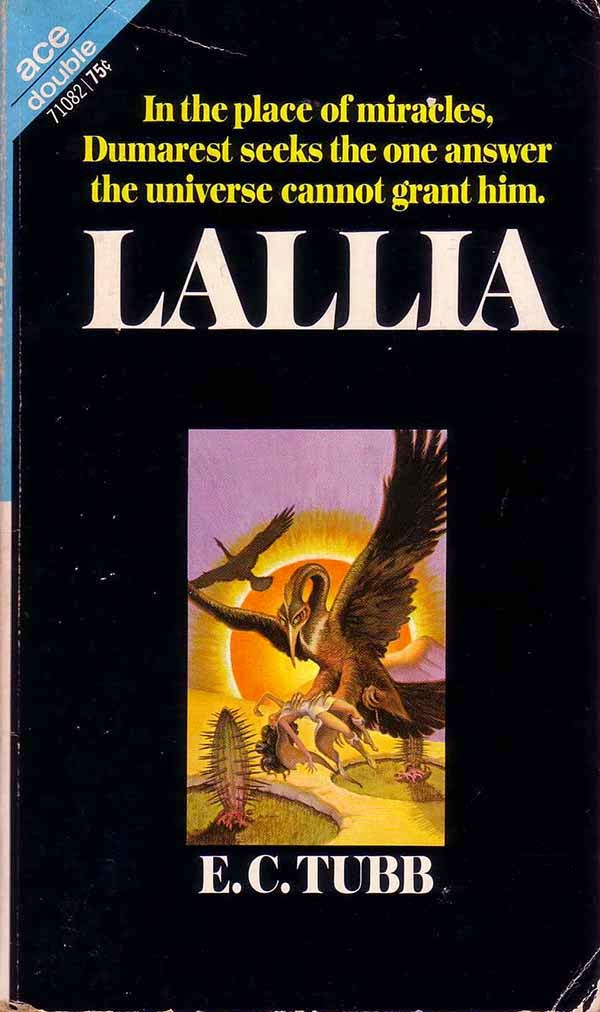For Christmas my brother got me an iTunes gift card. I don't listen to a lot of new music, and when I do, its on YouTube (I guess I am vulnerable to the charge of stealing the food right out of poor Hope Sandoval's mouth.) So I recently used the credit to purchase from Gateway e-books of some of E. C. Tubb's Dumarest novels. Today I finished Lallia, the sixth Dumarest adventure, reading it on my iPhone.
I won't deny that I would rather have a paperback copy of Lallia (in particular I am always curious about the interior illustrations you find in Ace Doubles), but I've not seen one in a used bookstore, and for price and convenience, the Gateway digital edition beat out Amazon and Abebooks' used copies.
The Gateway edition of Lallia has a blurb on its cover from Michael Moorcock. As those of you who follow my every move are aware, it is just such a Moorcock comment about Tubb that led me to start reading the Dumarest books in the first place. I certainly agree that the Dumarest books are "fast-moving and colourful." Another reason Moorcock, who describes himself as an "anarchist," has famously attacked more conservative writers like J. R. R. Tolkein, Robert Heinlein, and C. S. Lewis, and has engaged in what you might call feminist literary activism (revising his own work to be more sensitive to womens' issues, and trying to stigmatize and marginalize John Norman's Gor books), might appreciate the Dumarest series is that Tubb populates them with callous aristocrats, greedy businessmen, and manipulative intellectuals, as well as the legions of poor desperate people who suffer from their indifference and exploitation.
The other four Dumarest books I have read have included secondary plots about competing elites who enlist Dumarest in their struggles, but in Lallia it's all Dumarest; I think he appears in every scene. Dumarest, as part of his quest across the galaxy in search of Earth, a planet most people see as a fiction, joins the crew of a small space ship. This ship, the Moray, is bad news. The ship's captain tries to make a profit by carrying cargo and passengers between planets, but they are just barely getting by, and don't even have the money to keep the ship clean and properly maintain its systems. Tubb pithily characterizes each member of the doomed Moray's crew; the captain, who is horrified of space and indulges in the use of an alien symbiote that provides him vivid dreams, the dipsomaniac engineer who puts everyone at risk by getting drunk when he should be carefully tending to the sensitive hyperspace drive, the naive young steward who doesn't know what he has gotten himself into by signing up.
One of the themes of the Dumarest books which I haven't mentioned in earlier blog posts is religion. In every book the bizarre Cyclan, a galaxy-wide organization of scarlet-robe-clad geniuses who have had brain surgery to disable all emotion, appear. The members of the Cyclan use their fantastic mathematical ability and ice cold logic to manipulate others and increase their influence. The foil of the Cyclan is the Church of Universal Brotherhood; they have also appeared in all the Dumarest books I have read. The members of the Church try to help the poor and wretched, giving them food, helping them negotiate with the middle class for jobs and medical care, that sort of thing. Tubb (at least in the books I have read) has always portrayed the Church monks as selfless and sincere, but there is a Clockwork Orange aspect to the Church; those who accept food from the monks are expected to kneel before the "benediction light," which conditions them hypnotically with the command "thou shalt not kill." (You can believe that Dumarest, who regularly finds himself fighting for his life against assassins, gladiators, and monsters, has never knelt before the benediction light.)
Religion takes center stage in Lallia. The most responsible and sympathetic of the crew of the Moray is the navigator, who is a student of ancient religions and a committed believer. One of the planets the Moray lands on is home to a primitivist "back-to-nature" sect that considers metal "a thing of the Evil One" and uses only wooden and stone implements. In the end of the novel the ship crashes on a planet called Shrine, the destination of scores of sick or deformed pilgrims. These people seek a miraculous cure, and sometimes receive it, for on Shrine is an ancient alien artifact which nobody understands, but which truly has healing properties. Tubb's view of religion is nuanced, and each character, through his words and actions, evinces a different attitude towards religion, and we see religion employed as a tool to dominate others, as a comfort to those in trouble, and as an inspiration to perform good works.
This may be a book in which the author presents views about religion, but primarily Lallia is still an adventure story. As in earlier volumes, Dumarest ends up fighting for his life as a gladiator and rescuing a beautiful woman who has psychic powers. He also has to contend with a Cyclan assassin; the Cyclan is still trying to retrieve the ring that book 4's beautiful psychic woman, Kalin, gave him, a ring which has encoded within it a priceless technological secret. Lallia also moves the plot of Dumarest's saga forward; when he touches the artifact on Shrine Dumarest receives a vision of the galaxy, with the region where Earth lies highlighted.
Another solid Dumarest adventure; interesting characters, strange creatures and technology, plenty of violence and tragedy. Next up on my iPhone, Technos, the seventh Dumarest caper.




No comments:
Post a Comment